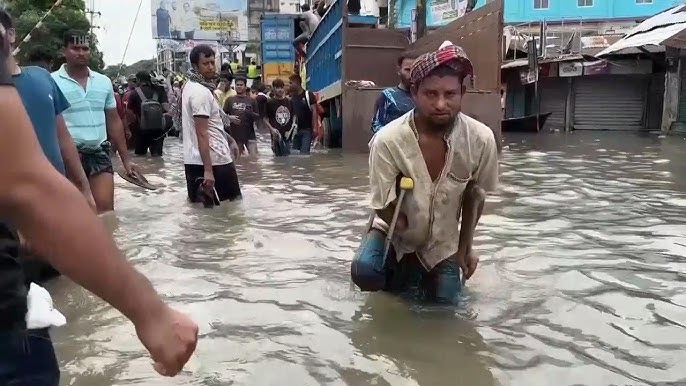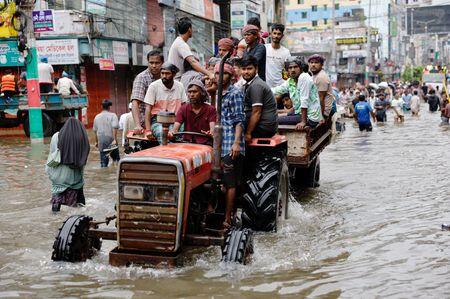DHAKA, Bangladesh — Severe flooding caused by relentless monsoon rains and overflowing rivers has left at least 20 people dead and affected more than 5.2 million in Bangladesh, officials reported Sunday.

The floodwaters have isolated many communities, creating an urgent need for food, clean water, medicine, and dry clothes. Remote areas are particularly hard-hit, with blocked roads hampering rescue and relief efforts.
Mohammad Yunus, the government’s Chief Adviser and interim leader, addressed the nation in a televised speech, stating, “The administration has adopted all necessary measures to ensure a swift return to normality for flood victims.” Yunus, a Nobel Peace Prize laureate, assumed leadership following former Prime Minister Sheikh Hasina’s departure amid a student-led uprising earlier this month.

The Bangladesh Meteorological Department has warned that flood conditions could persist if monsoon rains continue, noting that water levels are receding very slowly.
Abdul Halim, a 65-year-old farmer from the Comilla district, described the devastation to Reuters television: “My mud hut was swept away by a 10-foot-high surge of floodwater in the middle of the night. There are no goods and no water. Barely anyone has come with relief aid deep inside the villages.”
Some Bangladeshi citizens have alleged that the floods were exacerbated by the opening of dam sluice gates in neighboring India, a claim that New Delhi has rejected. Yunus addressed this concern, stating, “We have begun discussions with neighboring countries to prevent future flood situations.”

Official reports indicate that more than 400,000 people have taken refuge in approximately 3,500 shelters across 11 flood-affected districts. Nearly 750 medical teams are providing treatment on the ground, with the army, air force, navy, and Border Guard Bangladesh assisting in rescue operations.
The floods underscore Bangladesh’s vulnerability to climate change. A 2015 World Bank Institute analysis estimated that 3.5 million people in the country were at risk of annual river flooding. Scientists attribute the increasing severity of such events to climate change.

Kabita Bose, Country Director of Plan International Bangladesh, emphasized the scale of the disaster: “The impact of this year’s monsoon rains has been widespread and devastating. Entire communities have been completely inundated, and there are now millions of people, including children, in need of safe shelter and lifesaving humanitarian assistance.”
As relief efforts continue, the international community is closely monitoring the situation. The United Nations and various NGOs are mobilizing resources to support the Bangladesh government’s response to this humanitarian crisis.
Reuters



